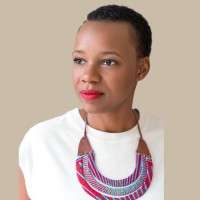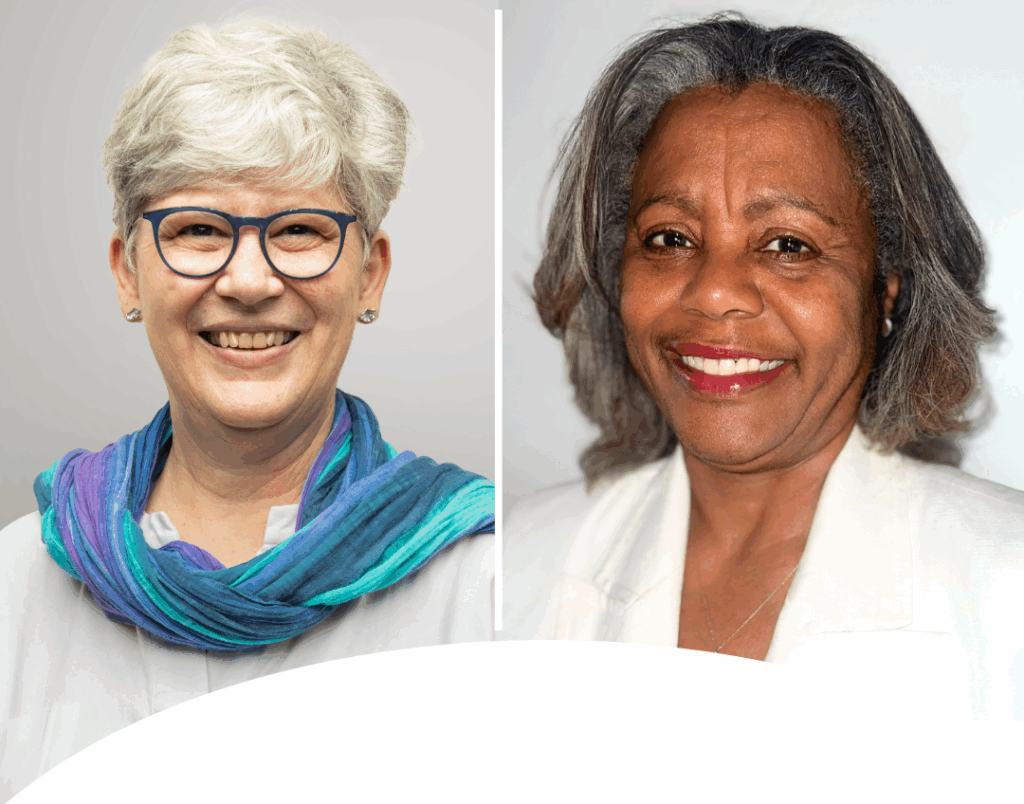Hear directly from the leaders of Fonkoze.
Read the full interview below or watch the video to experience the conversation firsthand.
At the heart of Fonkoze’s work in Haiti are the women who serve as the poto mitan—the central pillars in their families and communities. In this interview, we speak with Carine Roenen, Executive Director of the Fonkoze Foundation, and Dominique Boyer, CEO of Sèvis Finansye Fonkoze (SFF), who lead two distinct but complementary parts of the Fonkoze family of organizations. Together, their organizations provide a powerful, holistic approach to supporting women and families across Haiti. While the Fonkoze Foundation focuses on empowering women through development services, SFF offers vital financial services that allow individuals to build and grow their livelihoods. This conversation, conducted by Regine Theodat, Esq., delves into how both organizations continue to operate and adapt amidst Haiti’s ongoing challenges, and how their shared commitment to women’s leadership is shaping Haiti’s future.
Question 1:
Regine Theodat:
We know everything happening in Haiti—especially in Port-au-Prince—eventually impacts the whole country, even areas outside the capital. Since you both live and work in Haiti, how are your organizations still managing to operate? Have you had to adapt? What’s been difficult, and what’s still working?
Carine Roenen of Fonkoze Foundation: There are two things that are actually part of Fonkoze’s DNA, and I think they make things—not easy, but perhaps easier compared to others.
First, we’ve always valued proximity. We live and work close to the people we serve. Our operational model isn’t based on constantly traveling across the country, like some other organizations. That’s been a huge advantage. We rely on local staff who already live in the communities we serve, so they don’t need to travel long distances, which has become incredibly complicated.
Second, we’ve always practiced decentralized decision-making. I remember after the 2010 earthquake, our branches kept operating and serving clients because the branch directors had the authority to make decisions on the ground.
It’s the same now. When Mirebalais was attacked the other day, the local staff made the decisions—how to reorganize, evacuate, and continue working. That ability to make decisions at the field level really helps us adapt quickly.
Another huge factor is technology. The Foundation relies heavily on the Internet. We can’t travel much right now, so a lot of our supervision happens over Zoom. We use WhatsApp groups, email, electronic signatures—we’ve even implemented a complete electronic payment system.
If we lose access to the Internet, it would become very complicated to continue operating effectively.
And finally, about three years ago, we started setting up regional offices, and they’ve made a big difference. Just as an example, when we have expenses, we need documentation to prove those expenses were legitimate. Before, that paperwork would be brought to Port-au-Prince—but that’s no longer possible. Now, regional offices receive the documents, scan them, and input them into our accounting system. We work with digital copies instead of transporting physical files. That kind of adaptation has been crucial to keeping things running smoothly.
Dominique Boyer, CEO of Sèvis Finansye Fonkoze (SFF):
What’s really helped us continue providing services is our deep-rooted commitment and ability to adapt. We’re in the field, and we’ve built trust in the communities because we’ve always been there.
Even though our headquarters is in Port-au-Prince, our core operations have never been based there. That’s made a big difference in keeping things running.
We’ve had to be resilient—both our staff and our clients. We’ve adapted at every level. One thing that really helps is that we have a wide network across the country. We’re not just working from our branches—we have close to 1,000 community centers, many located up to two hours away from a branch. That kind of deep community presence is key.
We’ve also had to decentralize decision-making. Branch managers on the ground know what’s happening in real time. They’re the ones who can say, “Yes, it’s safe to work today,” or “No, it’s not.” We have to trust them to make those calls so we can keep services going.
Another big shift was around technology. A few years ago, we made the decision to equip all our branch managers with laptops. It turned out to be one of the best investments we’ve made. When local internet providers couldn’t support us, we switched to satellite service for our branches. That’s kept us connected and able to operate.
And remember—many of the places we serve don’t have any other financial institutions. So we know we have to find a way to continue. People are counting on us.
Question 2:
Regine Theodat: What would you say to someone in New York, Miami—or even South America—members of the Haitian diaspora who might be wondering, Is this really a good time to give to Haiti? They may worry their support won’t be used effectively with everything going on. What can we tell them? Why is it so essential to support Fonkoze’s work right now, despite the risks and challenges on the ground?”
Carine Roenen:
The need is enormous. You hear about it in the news—over a million people displaced, more than five million facing food insecurity. That’s real. But what you don’t hear in the news is the incredible courage of the Haitian people.
People are adapting. Entire markets that used to operate in areas now overrun by violence have just moved. Vendors found new places to sell. And over 80% of displaced people aren’t in camps—they’re living with host families. Friends, relatives—people have opened their homes. They’re finding ways to survive together, to keep going.
That’s what inspires us. We focus on solutions that work. Whether it’s the graduation program, training programs, or microfinance services—we know these tools help people move forward. When we support their efforts, even just a little, we see real results.
This is the right moment to lean in and do more.
And I’ll be honest—the Foundation couldn’t do what it does without our collaboration with Sèvis Finansye Fonkoze (SFF). Just the other day, we lost access to the Mirbalais branch. We needed cash for trainings, for direct transfers so families could launch income-generating activities. Without access to cash, we’re stuck.
Having that relationship with SFF and its network of branches makes everything we do possible. It’s a huge part of why Fonkoze is able to be effective—we already have the infrastructure, and we’re using it every day to reach people where they are.
Regine Theodat:
Yeah, I think you both really hit the nail on the head. The reason it’s a good time to give is simple—because the need is real and urgent. And the reason it’s a good time to give to Fonkoze specifically is because you know what you’re doing. You’ve proven that over the last 30 years. You have two institutions in Haiti with different models that are already distinct from anything else in Haiti—but the way they work together creates something unique, efficient, and effective. It’s a model that understands the realities of working in Haiti, especially because it’s decentralized.
We touched earlier on how people in Haiti are adapting in the face of ongoing challenges. As someone from the diaspora, I often find it difficult to keep hearing about Haitian resilience—it’s painful because what we really want is for Haitians to finally catch a break. And yet, the truth is that resilience is exactly why Haiti endures. You mentioned the markets being lifted and relocated—massive operations that somehow get moved with astonishing coordination and strength. Are there any other moments you’ve witnessed recently that capture this incredible adaptability and determination?
Dominique Boyer:
You know, even with all the roadblocks—accessing the markets, what’s going on in Port-au-Prince, in Kenscoff—you still see people finding a way to bring their goods to market.
I look around and see young kids still going to school, even with all the insecurity. Just that simple act of showing up to school every day—it’s powerful.
And our team, our employees—they keep showing up, too. I’ve seen them come into the office with so much courage. Just last night, some of them had to sleep outside because they couldn’t get home. Then they found out their homes were burned. And still, the next day, they showed up for work.
In Mirebalais, our clients are coming to other branches and saying, “This is what happened to my business—but I’ll find another way.”
That kind of perseverance—it’s something else. Even for me, watching it unfold, it moves me. And it’s not that they’re not afraid—they are. But it matters to them to keep going, to keep showing up for their families, their communities.
Sometimes even I ask myself, where do they find that kind of courage?
It’s hard, really hard. And I know we talk about resilience a lot—I’ve been to meetings where partners say it over and over. And sometimes I get tired of hearing it. But at the same time, I think—if they don’t keep going, then who will?
They have to. We all have to. That’s what keeps me going, too.
Carine Roenen: That’s it—it’s the day-to-day stuff. It’s continuing to move forward, and also continuing to find ways to laugh, to get together with friends for a beer, to organize a First Communion celebration because your child reached that milestone. All of these things continue. They’re not as grand as they used to be, and there’s definitely not as much food and drink as before—but people still do it.
They still go to Mass every Sunday morning, and they dress up to do so. They find courage in their neighbors, in getting together, in friendship. It’s really quite amazing. I would almost call it courage instead of resilience.
Dominique Boyer: Courage, perseverance—you see people trying to rebuild their businesses despite everything that’s happened. They ask themselves, “What’s next? What am I going to do now?” And they keep going.
Regine Theodat: They persevere.
Carine Roenen: In a way, it’s the same thing we saw after the earthquake. Informal businesses—small businesses—are much easier to pivot and turn around than larger ones that require a big initial investment. If you lose that investment, starting again is incredibly complicated. The people we work with—typically running smaller, informal businesses—are honestly much more agile than bigger enterprises.
Regine Theodat: A final question for you both. What brings you hope?
Dominique Boyer: As long as there is life, there is hope. And we will continue working and supporting. It’s real—it’s every day.
That’s what drives me, seeing how, despite everything that’s going on, people still have hope that tomorrow will be better. We should be there to support them and continue providing whatever help we can.
Carine Roenen: Yes, it’s the courage of the people. And the fact that they think, “If they can do it, why can’t I?” We all move forward together. There’s also the fact that people are coming together in ways they never did before.
You see collaborations across social divides that you didn’t necessarily see before. And honestly, that gives me a lot of hope, too.
Even in the face of immense adversity, the work
of Fonkoze continues—quietly, steadfastly, and
powerfully—just like the Haitian women who continue
to lead. Carine and Dominique remind us that when we
invest in local leadership and trust Haitian solutions,
real change is only possible and is already happening.
Now, more than ever, your support is crucial. Join us in
walking alongside these resilient communities. Donate
today.
Special thanks for our moderator:
Régine Théodat,
Disruptor & Strategist,
Forever a Haiti Optimist





